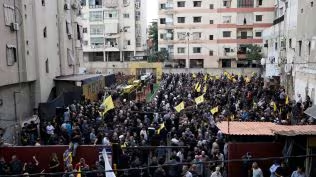Pager, walkie-talkie attacks in Lebanon: What you need to know
In a second wave of attacks believed to have been carried out by Israel targeting electronic devices in Lebanon, at least 20 people were killed and more than 450 wounded on Wednesday. While walkie-talkies and solar equipment exploded in Beirut and other parts of Lebanon yesterday, a slew of pagers used by militant group Hezbollah blew up on Tuesday, killing 12.
At start of new phase in war, says Israel Minister
The newly launched attacks have exacerbated fears that the two sides’ simmering conflict could catapult into an all-out war. Without mentioning the explosions, Israeli Defense Minister Yoav Gallant told troops on Wednesday, “We are at the start of a new phase in the war — it requires courage, determination and perseverance.” Lauding the work of the army, he was quoted as saying by AP, “the results are very impressive.”

While the attack is believed to be against Hezabollah, several civilians were killed. The second attack furthers concerns over the potentially indiscriminate casualties caused in the attacks during which blasts occurred at spots where pager holders were located, whether it be in homes, cars, grocery stores, cafes. Civilians, mainly serving Lebanon’s Shiite community, two health care workers were among those killed on Tuesday. While pagers were used by Hezbollah members, there was no guarantee who held the device when the blasts happened. Doctors, nurses, paramedics, charity workers, teachers and official administrators who work for the militant group linked associations had pagers in their possession.
Grim situation in Lebanon
The blasts have sent terror and shockwaves in Lebanon over the last two days. Cries of pain and panic emerged out loud in streets, shops and homes across Lebanon. In the power of explosive compounds disguised within the devices, the blasts threw adult men off motorcycles, slamming into walls, witnesses told The New York Times. People who were out shopping fell to the ground, crying in pain and smoke rising from their pockets.
Mohammed Awada, 52, and his son were driving by one man whose pager exploded, he said. “My son went crazy and started to scream when he saw the man’s hand flying away from him,” he said.
Why pagers and walkie talkies were targeted
After the explosions, Hezbollah leader Hassan Nasrallah issued a warning to group members not to carry cellphones, alerting that they could be used by Israel to keep a track of their movements. Pagers function on different wireless networks than those of mobile phones. The technology behind pager is simple and poses less risks for intercepted communications.
The hand-held radios or walkie talkies were purchased by Hezbollah five months ago, around the same time that the pagers were bought, Reuters reported quoting a security source. Details about walkie-talkies detonated are yet to be known, according to BBC. Video recorded in the aftermath showed destroyed devices bearing the brand Icom, a Japanese company and a statement from the firm said the IC-V82 model is a handheld radio exported to Middle East from 2004 to 2014 and has not been shipped since then.
Gold Apollo says Hungarian firm used its name on pagers
Regarding the pagers which exploded on Tuesday, Gold Apollo, Taiwanese firm said it authorized a Hungary-based company, BAC Consulting KFT, to use its name on devices delivered to Hezbollah. However, a Hungarian government spokesperson told AP that the pagers were never in Hungary and BAC Consultants only acted as intermediary. Hungarian national security services were cooperating with international partners, the Hungarian spokesman, Zoltán Kovács wrote on X.
What international law says
As per international law, booby-traps are banned, according to Mary Ellen O’Connell, a professor of law and international peace studies at the University of Notre Dame in Indiana. “Weaponizing an object used by civilians is strictly prohibited,” she told AP. The UN human rights chief, Volker Türk has urged for an independent probe into the mass explosions and the UN Security Council called for an emergency meeting on the issue on the behest of Algeria’s request. Volker said, “The fear and terror unleashed is profound.”
Hezbollah leader decided to go low in tech
The Iran-backed Hezbollah has been prone to Israeli attacks mainly using sophisticated technologies. Back in 2020, Israel assassinated Iran’s top nuclear scientist using an AI assisted robot controlled remotely through satellite.
After Israel targeted senior Hezbollah commandos with targeted assassination earlier, their leader resorted to go low in technology use as Israel went high-tech. It was clear, a distressed Hezbollah chief, Hassan Nasrallah, said, that Israel was using cellphone networks to pinpoint the locations of his operatives. “You ask me where is the agent.” Mr. Nasrallah told his followers in a publicly televised address in February. “I tell you that the phone in your hands, in your wife’s hands, and in your children’s hands is the agent,” according to NYT.
Conflict dates back to 1982
Hezbollah has been involved in attacks against Israel along the southern Lebanese border for about a year, since the Israel-Hamas war began. The conflict, as per Al Jazeera, dates back to 1982 when Israel invaded Lebanon in June 1982 in retaliation to attacks launched against by the Palestine Liberation Organization from southern Lebanon. The civil war continued for seven years afterwards.
With inputs from AP
Disclaimer: The copyright of this article belongs to the original author. Reposting this article is solely for the purpose of information dissemination and does not constitute any investment advice. If there is any infringement, please contact us immediately. We will make corrections or deletions as necessary. Thank you.





